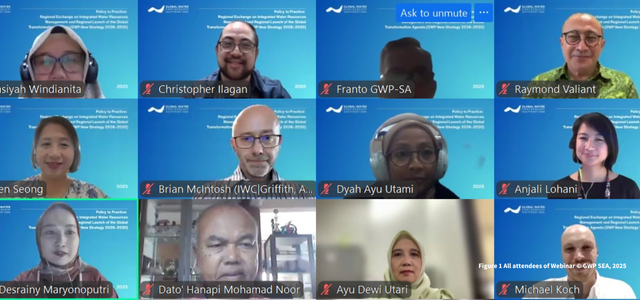Across Southeast Asia, climate-driven floods, droughts, rapid urban growth, and water quality pressures are intensifying. The session brought together practical lessons and policy perspectives from Vietnam, Indonesia, Singapore, Australia, Finland, and partners in the global GWP network.
Throughout the exchange, a clear set of shared priorities emerged across the region. Vietnam underscored the need for stronger water governance and coordination, particularly across ministries and provincial agencies, as the country faces growing pressures from floods and pollution. Indonesia highlighted the importance of using data and digital systems, such as its Water Security Index and Hydrological Monitoring, to guide evidence-based planning and empower local river basin authorities. From Singapore, the message was clear: long-term planning and cutting-edge innovation are fundamental, with digital water systems, reuse technology, and transparent communication helping citizens value every drop.
Meanwhile, Australia emphasized fair and accountable basin-level governance, supported by clear allocation rules and real-time information, especially as climate and Indigenous rights become central to future water discussions. Finland reinforced the role of public trust and transparency, showing how open data platforms and participatory planning keep institutions accountable and ecosystems protected. Development partners also echoed these lessons, stressing that communities, women, and vulnerable groups must remain at the center of water decisions, and that resilient financing models and partnerships are needed to turn plans into long-term action. Together, these perspectives painted a unified picture: water security in Southeast Asia will be achieved not by policy alone, but by translating lessons into practice and mobilizing people, institutions, and resources at every level.
Regional Launch: Setting a New Direction for Water and Climate Investments.
The second part of the webinar marked an important milestone, the Regional Launch of GWP’s 2026–2030 Global Transformation Agenda. Dr. Raymond Valiant opened the session by acknowledging the insights shared throughout the day and invited the panel to reflect on how the region can move together into this new strategic phase.
Introducing the strategy, Anjali Lohani, Senior Water and Climate Resilience Specialist at Global Water Partnership Organization (GWPO), outlined the bold ambitions guiding GWP’s next chapter. She emphasized that the world is entering a pivotal period for accelerating climate-resilient water investments, noting GWP’s global achievements and future targets. “The world needs urgent and audacious action,” she stressed, highlighting the strategy’s aim to influence USD 15 billion in climate-resilient water investments by 2030, with USD 500 million mobilized directly through country partnerships. She shared that the new agenda builds on GWP’s long-standing strengths in IWRM while expanding into investment readiness, governance support, data systems, gender inclusion, and digital transformation, a “practical fusion between governance, finance, and capacity building.”
Responding from a regional perspective, Christopher Ilagan, Chair of GWP Southeast Asia, underscored the relevance of this shift for Southeast Asia’s rapidly evolving water challenges. “Climate change, urbanization, and population growth are intensifying pressure on our water systems” he noted, calling for stronger regional collaboration and multi-stakeholder partnerships. He pointed to promising progress in the region, from Singapore’s circular water model to Indonesia’s coordination efforts across island basins, as proof that transformation is possible when countries move from policy to practice. He emphasized that the region must now focus on aligning with ASEAN frameworks, strengthening project preparation, and unlocking blended finance to bring climate-resilient water solutions to scale. “Let us lead the way into IWRM 2.0, digitally connected, inclusive, and climate-resilient” he encouraged.
Adding a country-level perspective, Dr. Amron, representing the Indonesia Water Partnership, welcomed the strategic shift but cautioned that Southeast Asia must move with balance and context sensitivity. He emphasized that while climate finance brings major opportunities, investments must be grounded in governance, capacity, and equity. “Money may flow, but outcomes may not” he noted, if institutions and coordination mechanisms are weak. He stressed that vulnerable groups, farmers, fishers, and women, must remain central to financing decisions, and that investment shouldn’t bypass the inclusive spirit of IWRM. His message was clear: “The move toward climate-resilient investment should not replace IWRM, it must build on it.”
Closing the session, Dr. Raymond emphasized that the transformation agenda will succeed only through shared leadership and sustained partnership. He praised the region’s ongoing efforts, from governance reforms in Vietnam to innovation in Singapore and watershed stewardship in Indonesia, and reaffirmed that government, private sector, and civil society collaboration will be vital in the years ahead. With the launch formally announced, he reminded participants that Southeast Asia is ready to lead water-climate action rooted in cooperation, equity, and long-term resilience.
Visit the speakers’ materials on the panel (right side for desktop view, or at the bottom of the page for smartphone view).
The full recording of the session is now available on GWP SEA YouTube channel.
